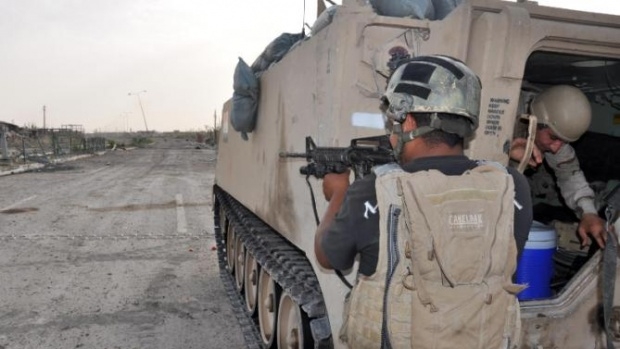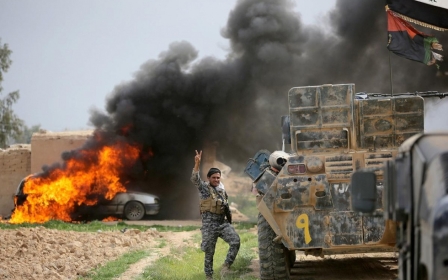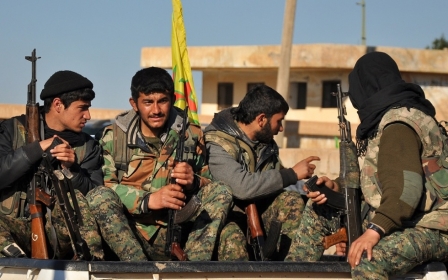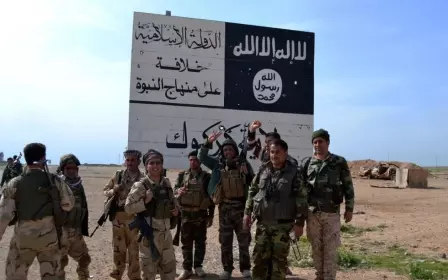Battle against IS key for Iraqi, Kurdish officials but divisions remain

SULIMANIYAH, Iraq - High-level politicians and analysts met in Iraq's Sulimaniyah to discuss the war against the Islamic State (IS) group and other regional crises, as part of a two-day conference in the country's Kurdish north.
The third Sulimani Forum, which came to a close on Thursday at the American University of Iraq in Sulimaniyah (AUIS), hosted senior Iraqi officials, including Foreign Minister Ibrahim al-Jaafari, who spoke alongside their Kurdish counterparts about the urgent need for unity in Iraq to confront IS on both a military front and on a societal level.
“We should form one front against one enemy,” Jaafari said about the fight against IS, stressing the need for cross-sect harmony in Iraq.
High-ranking officials, among them the speaker of Iraq’s parliament Salim al-Jabouri and his Kurdish equivalent, Yousif Muhammed Sadiq, took a similar line and expressed unwavering confidence that IS would be defeated militarily. They pointed to the recent operation to reclaim Tikrit, where Shiite militias and the Iraqi army appear to have gained significant ground against IS, as evidence of an imminent battlefield victory.
US Deputy Assistant Secretary for Near Eastern Affairs, Brett McGurk, said the global coalition against IS had reclaimed some 5,000 square miles of territory that was under the group’s control, without detailing the claw backs. US Ambassador to Iraq Stuart Jones said IS is “on the run” and has been reduced as a fighting force to “IEDs (improvised explosive devices) and snipers”.
There was, however, widespread concern about how best to respond to the societal problems that politicians admitted had allowed IS to flourish in the first place. Politicians and analysts alike acknowledged that disenfranchisement among the Sunni community was a major problem that is yet to be resolved.
“If we assume Daesh (Arabic acronym for IS) will be defeated, what afterwards?” asked Kamaran Qaradaghi, former chief of staff for ex-Iraqi President Jalal Talabani. “We only deal with issues when a crisis appears. We need a different kind of approach for the future, we need a clear vision.”
While the political rhetoric of unity was high, along with recognition of the need to redress divisions between Iraq’s religious and ethnic groups, no specific plan of action was articulated to deal with these issues. Neil Quilliam, head of Chatham House’s Middle East and North Africa programme, warned in the conference’s final panel that the key drivers of the Arab Spring uprisings – high unemployment and restricted public space – remain as unresolved issues. He explained that solving these problems would prove vital in undermining the lure of groups including IS.
Leader of the Kurdish Democratic Union Party (PYD), Salim Muslim, called for democracy to be developed as part of the fight against IS and said the democratic system in Rojava (the Kurdish area of Syria) could serve as a model for the region.
“In the beginning of the 21st century, all of humanity, and this region especially, is looking for the freedom of democracy,” he said. “We established a model in Rojava which is a self-democratic model. It should be a model for Syria, it could be a model for all the Middle East.”
When talk of political unity and the need to remedy Iraq’s divisions came to an end, ingrained divisions were revealed when the discussion moved onto oil. Representatives from the Kurdistan Regional Government (KRG) and Baghdad quarrelled over the implementation of an oil agreement between the two parties, which stipulated that the KRG should deliver 550,000 barrels per day (bpd) for export with revenues collected by the central Iraqi government.
“There were two stages: first, building trust in terms of oil production and, second was the budget agreement which we have done with the KRG,” Iraqi Oil Minister, Adil Abdul Mahdi said. “But we have some problems in the implementation and interpretation of the agreement. In addition the core problem is the absence of an oil and hydrocarbon law.”
“There is still no real unity between Baghdad and Erbil (in Kurdistan), we need to rebuild it.”
Kurdish Minister of Natural Resources, Ashti Hawrami, said the KRG had “not quite” met the 550,000 bpd agreement due to “purely technical” reasons, adding that they had delivered 97 percent of the oil required under the agreement with Baghdad.
Iraqi Finance Minister Hoshyar Zebari later said, in a panel on which he advocated economic diversification to solve Iraq’s financial crisis, that the oil deal between the KRG and Baghdad was “holding” and that “both sides are committed to it, both sides want it.”
Despite this reassurance, discord was apparent on both sides, summed up by Joost Hiltermann from the International Crisis Group, who said: “Despite pressure from Western states, Iran and Turkey for Baghdad and Erbil to work together, they just don’t want to.”
Divisions among senior Baghdad officials were seemingly laid bare too, when Foreign Minister Jaafari appeared irritated by Vice President Usama al-Nujayfi when the latter said “the fight against IS must be led by Sunnis”. Nujayfi, who is from the Sunni community of Mosul, also called for Sunnis to be armed in order to fight IS.
Jaafari, who was in the audience during Nujayfi’s speech, responded by saying the battle against IS is a “war on terrorism not for any specific group to take the lead”.
In a later session, Liz Sly, a journalist with the Washington Post, quoted an unnamed Iraqi politician as having told her: “The problem with dialogue in Iraq is that it usually means telling the other person they are wrong.”
The anecdote widely reflected divisions displayed by the politicians who attended, and the only speech to receive a standing ovation emphasised the depth of disunion across Iraq.
Muhammad Haji Mamoud, Kurdish socialist leader and famed military commander, gave an impromptu talk in a session on Thursday and criticised other speakers for having papered over the cracks when it came to confronting Iraq’s problems.
“Those officials from Baghdad who came here, if they came by car they would have known that Iraq is divided into three parts,” he said, meaning that there are specific Sunni, Shiite and Kurdish zones in the country.
Mamoud said Iraq must “divide or die” and concluded that federalism may be “the only answer” to deeply entrenched divisions.
On top of widening divisions between Iraq’s three dominant communities, the pressure of an explosion of internally displaced persons (IDPs) was emphasised by Kurdish officials.
“One in six people in Kurdistan is now an IDP,” Farhad Atrushi, governor of Duhok province. In 2013 Iraqi Kurdistan was estimated to have a population of 8.35 million people, which would mean there are around 1.4 million IDPs in Kurdistan now, according to the governor.
Atrushi said that in Duhok there are 820,000 IDPs and refugees. He said 20 camps have been set up to accommodate them all, but that this had brought enormous financial strain on the province that required an urgent solution from Baghdad.
Deborah Amos, a US journalist with National Public Radio, said those in the camps, while supported by Kurdish officials, had never been visited by anyone from the central government.
“The message to IDPs from Baghdad is: ‘You don’t matter’,” she said.
Iranian influence up but reach overplayed
The ever-growing influence of Iran was discussed little throughout the forum, with moderator Dov Zakheim, who is on the American University of Iraq board of trustees, describing it as the “invisible elephant in the room”.
At the same time the conference was taking place, Senior Iranian General Qasem Soleimani was pictured walking with fighters in the battle for Tikrit, where he has been described as “overseeing” the operation.
Hayder al-Khoei, an associate fellow at the international affairs think tank, Chatham House, explained the expanded Iranian influence in Iraq by quoting an unnamed Iraqi politician.
“Both the US and Iran are our strategic allies, but Iran didn’t let us down at our hour of crisis,” he cited the politician as having said, in relation to the battle against militancy in Iraq.
The full withdrawal of all US combat troops was completed in 2011 and while the Americans have bombed IS in recent months, they have been reluctant to commit to a new ground offensive.
And while Iranian influence has recently flourished across the region, which has led some officials in Tehran to brag about four regional capitals – Damascus, Beirut, Baghdad and Sanaa – being under their control, analysts at the Sulimani Forum were keen to play down how far this will extend.
“I don’t think so,” said the ICG’s Hiltermann, when asked if Iran had been the “winner” from regional turmoil. “Iran has gained influence but it is a Shiite power, a Persian power – there is only so much support it can get from Arab lands.”
“Tehran knows it cannot govern, or appoint someone to govern, Sunni areas.”
Iran was emphasised, however, as exercising domination over their ally, Bashar al-Assad in Syria, who is from the Alawite sect of Shiite Islam. Randa Slim, a Lebanese-American analyst, said: “The Syrian regime is trying to keep the image it is in control – but key actors now answer to Iran,” referring to the Lebanese Hezbollah fighters standing alongside President Assad’s forces.
Slim said Iranian support for the Syrian president will not end as Tehran “does not have any trustworthy candidates to replace Assad”.
Kurdish officials said their priority in Syria – shared by Western powers - was not the removal of the Assad government but the battle against IS. A former chief of staff to the KRG questioned whether it was possible to take on the group in the same way it has been in Iraq.
“In Iraq you have partners to defeat IS – in Syria is there a partner on the ground to defeat them?” asked Fuad Hussein, who went on to say that in Iraq the strategy against IS was proving successful up to a point.
“If the strategy is to turn IS from a state into a terrorist group, our strategy is on course,” he said, explaining that there was still no plan to remedy problems in society that had given rise to the group and its “ideology of destruction”.
The Iraqi Finance Minister, Zebari, brought the conference to a close by warning of the danger posed if trust is not built between Shiite-dominated Iraqi security forces, accused of carrying out atrocities against Sunnis, and local communities.
“Without ensuring (Iraqi) security forces are seen as legitimate by the people, gains made against IS can still be lost.”![]()
New MEE newsletter: Jerusalem Dispatch
Sign up to get the latest insights and analysis on Israel-Palestine, alongside Turkey Unpacked and other MEE newsletters
Middle East Eye delivers independent and unrivalled coverage and analysis of the Middle East, North Africa and beyond. To learn more about republishing this content and the associated fees, please fill out this form. More about MEE can be found here.




